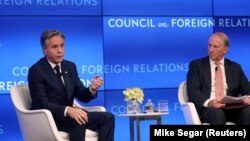During a recent discussion in Washington, Secretary of State Antony Blinken said the world is at an “inflection point,” where current decisions will shape the future for decades.
He noted that after a time of relative safety and prosperity following the end of the Cold War, major disrupters have appeared:
“Obviously, the rise of China that has both the power and the intent to change the system that we’re living in. A revanchist Russia that we’re dealing with every single day. A panoply of interrelated and unfortunately mutually reinforcing transnational challenges, global challenges, that we have to find a way to deal with effectively.”
Those challenges include the proliferation of information systems with multiple unintended consequences; migration; food insecurity; climate change; threats to global health; the recession of democracy; and, geopolitical competition.
“We have a vision that is clear and unambiguous, what we’d like the world to become: free, secure, open, prosperous,” he said. “It means countries that are free to decide what their path will be, who their partners will be. It means an international system that’s built around rules, transparently, applied fairly and equitably with goods, with information, with people flowing lawfully and freely.”
On the other hand, Secretary Blinken said, we face countries wanting to erase any of the norms and standards that have led to prosperity in the last 75 years; countries which want to reassert spheres of influence and use predatory practices to gain economic power; which weaponize information and assert that universal human rights are purely internal matters.
To counteract such a worldview, the United States is, first, investing in its own competitiveness. Second, it is working to reinvigorate its alliances and partnerships, such as NATO and partnerships in East Asia:
“At the same time, we’ve also been building fit-for-purpose partnerships, where different collections of countries – and not just countries – other stakeholders, other actors, the private sector, the nongovernmental world – come together to try to tackle discrete problems.”
When asked to describe the “Biden doctrine,” Secretary Blinken, who declared his resistance to doctrines in general, said, “It starts with our strength at home, our competitiveness, with the investments we’re making; and then it goes to making sure that we are strengthening, and as necessary, forging new alliances and new partnerships. Because we can’t do it alone.”






